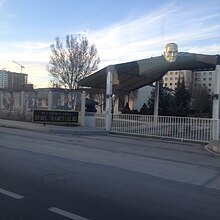Millî Güvenlik Kurulu
The Millî Güvenlik Kurulu ( MGK ; German " National Security Council ") is a politico-military body in Turkey . It has an advisory function. Similar committees with changing names and competencies have existed since 1933.
history
For the first time, a politico-military body was formed under the name Yüksek Müdafaa Meclisi ("High Defense Council") in 1933. According to Order 14433, the Defense Council consisted of the President, Prime Minister, Chief of Staff and the Cabinet members. In 1949, the Millî Savunma Yüksek Kurulu (“High Council for National Defense”) followed in accordance with Law No. 5399 . This council determined the broad guidelines for security policy. Only selected ministers still belonged to it.
After the military coup of 1960 , the new constitution redefined the name and powers of the Security Council. The council was given the current name Millî Güvenlik Kurulu .
After the military coup in Turkey in 1980 , a National Security Council called Millî Güvenlik Konseyi took power. It consisted of the military members (including the commander of the gendarmerie) of the original National Security Council and led the business of government until December 6, 1983. The National Security Council consisted of the Chief of Staff Kenan Evren and the commanders of the armed forces. Civilians weren't involved. After the handover to a civilian government, a National Security Council was again established in accordance with Article 118 of the Turkish Constitution of 1982 . This council was given its current name and had considerable influence. He met monthly. Members were the President, Prime Minister, Defense Minister, Foreign Minister, Chief of General Staff and the commanders of the armed forces. The National Security Council determined the main features of Turkish security policy. The Council has a General Secretariat attached to the Prime Ministry.
After a constitutional amendment in 2003, the influence of the Turkish armed forces was reduced. Since then, the committee has also included the deputy prime ministers and the ministers of justice and the interior. This means that civil policy has a clear majority in the Council. The recommendations to be observed "as a matter of priority" have been reduced to "recommendations" which the Council is allowed to give to the government. The meeting of the council has been reduced from monthly to bimonthly. The power of the chief of staff to demand that the council meet has been withdrawn. With the change, the General Secretariat was placed under civilian control, after the head of the authority had to be a general until 2003. If the president and prime minister (from 2019 only the president) appoint an officer as head of the authority, they have to obtain an opinion from the chief of staff.
Competencies
The Millî Güvenlik Kurulu has an advisory role according to the constitution. Article 118 provides
“The National Security Council communicates to the Council of Ministers of its recommendations on the definition, definition and application of the national security policy of the state and of its views in order to ensure the necessary coordination. The Council of Ministers shall take into account the decisions on measures which the Council deems necessary with a view to protecting the existence and independence of the state, the unity and indivisibility of the country, the well-being and security of the community. "
See also
Web links
Individual evidence
- ↑ The Constitution of the Republic of Turkey ( Memento of the original from September 22, 2011 in the Internet Archive ) Info: The archive link was inserted automatically and has not yet been checked. Please check the original and archive link according to the instructions and then remove this notice.
